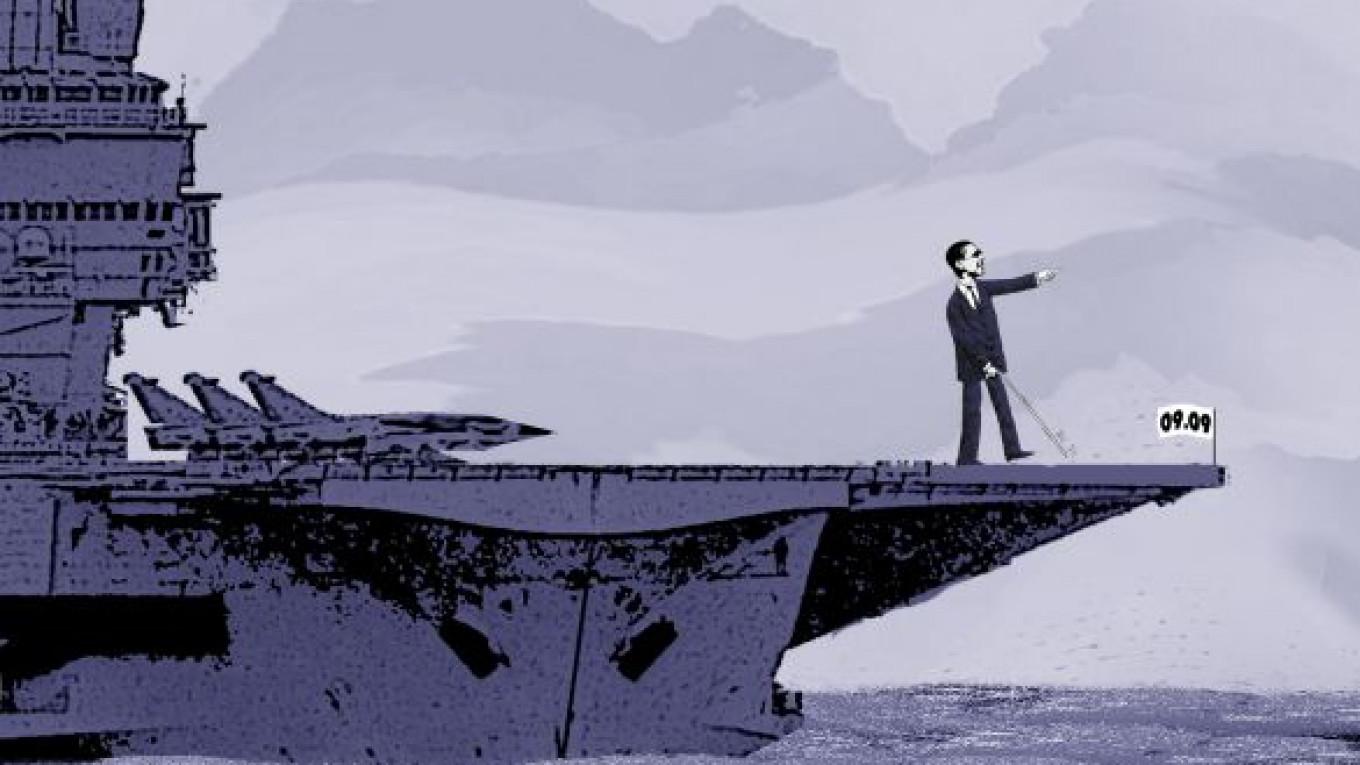Now we know with certainty that a week or so remains before U.S. President Barack Obama must deal with what is clearly the most difficult foreign policy decision of his presidency. Obama said it is necessary to punish the regime of Syrian President Bashar Assad.
Obama had good reason to first turn to Congress for approval of military action against Assad. Washington suffered its most serious diplomatic defeat of the last decade when the British Parliament rejected Prime Minister David Cameron's appeal for a military strike against Syria. This was a particularly strong blow given that Britain is Washington's staunchest ally and has always been willing to fight alongside the U.S. — even when it contradicted common sense, as in the 2003 invasion of Iraq. I suspect that the U.S. Congress, too, will not be in a hurry to vote in favor of military action, particularly given the less-than-convincing evidence that Assad's regime was, in fact, responsible for the chemical weapons attack.
Obama's problem is not just that he intends to intervene militarily but that he intends to do it half-heartedly.
At the same time, however, Congress will probably give its consent when it comes down to casting the final vote, giving Obama the green light to commit what is most likely to be the largest foreign policy mistake of his presidency. The problem is not just that he intends to intervene militarily, but that he intends to do it half-heartedly.
Soon after Washington's crushing defeat in Vietnam, U.S. leaders formulated principles governing future use of military force. It is often referred to as the Powell Doctrine in honor of former U.S. Secretary of State and chairman of the Joint Chiefs of Staff Colin Powell, although the true originator was former President Ronald Reagan's defense secretary, Frank Carlucci. That doctrine states that the armed forces should be used only when the vital interests of the U.S. are at stake and only when war is the sole remaining option.
The key component of this military doctrine is that once the decision to go to war is made, overwhelming force should be employed to gain the maximum advantage over the enemy. The army should be given very specific goals that are achievable through military means. Once those goals are achieved, the troops should be immediately withdrawn.
Whenever Washington followed these principles, as it did during the first Gulf War of 1990-91, the U.S. achieved both military and political victories. But whenever the army was given goals that could not be achieved by military means, such as establishing democratic institutions, the U.S. suffered defeat. That is what happened in Afghanistan, Iraq and Libya. Although the U.S. and its allies could easily crush organized resistance and overthrow tyrannical regimes by virtue of their huge military superiority, they were powerless to stop guerrilla movements that operate without centralized command centers. And the guerillas were bound to prevail because the local populations actively resisted attempts by foreign troops to instill "democracy at gunpoint."
But now Obama has gone even further. Not only does the military lack a clearly defined goal that, once achieved, would make the operation a success. Obama's vague intention to "punish" the Assad regime is just as senseless from a military standpoint as "establishing democracy" with guns and bombs. By limiting the scale of operations beforehand, Obama sends a clear signal that Assad has only to weather a few losses before continuing to assail the rebels unhindered.
Obama believes that U.S. air strikes can prevent Assad from using chemical weapons again. At the same time, U.S. officials explained that the U.S. would not attack storage facilities for those weapons because the resulting number of victims could far exceed those who have already died in the Damascus suburbs. That means the goal of the attacks would be to force Assad to guarantee that he would not use chemical weapons in the future. But how can the U.S. achieve that goal if the Assad knows in advance that the U.S. military campaign will be limited in scope?
Under such conditions, the U.S. is likely to be dragged into a long and pointless war. The limited bombings will probably fail to produce the desired result, and the verbal attacks against Obama from both Republicans and Democrats will increase. That will likely force Obama to reluctantly take an additional "limited" and equally ineffective bombing campaign that could easily trigger a vicious cycle of escalating hostilities. This is exactly how Washington became embroiled in the disastrous war in Vietnam.
Obama has maneuvered himself into a corner. The whole world remembers how, one year ago, he declared that the use of chemical weapons was a "red line" that he would not allow the Assad regime to cross. Now Obama has only one alternative: to try to punish the Syrian regime and risk getting drawn into a civil war, or else eat his words by ignoring the fact that Assad has flouted all of his warnings and threats. This becomes a choice between bad and very bad.
Then there is the question of Russia's role in the current situation. Foreign Minister Sergei Lavrov has correctly said Western military intervention in Syria is fraught with the risk of unpredictable consequences. At the same time, however, about a year ago then-U.S. Senator Richard Lugar proposed that Moscow work with Washington to establish international control over Syria's chemical weapons. Russia ignored that proposal in the firm conviction that the Syrian authorities would act responsibly and not use chemical weapons. Had Russia followed up on that initiative, the U.S. would not be threatening Syria with air strikes today.
Alexander Golts is deputy editor of the online newspaper Yezhednevny Zhurnal.
A Message from The Moscow Times:
Dear readers,
We are facing unprecedented challenges. Russia's Prosecutor General's Office has designated The Moscow Times as an "undesirable" organization, criminalizing our work and putting our staff at risk of prosecution. This follows our earlier unjust labeling as a "foreign agent."
These actions are direct attempts to silence independent journalism in Russia. The authorities claim our work "discredits the decisions of the Russian leadership." We see things differently: we strive to provide accurate, unbiased reporting on Russia.
We, the journalists of The Moscow Times, refuse to be silenced. But to continue our work, we need your help.
Your support, no matter how small, makes a world of difference. If you can, please support us monthly starting from just $2. It's quick to set up, and every contribution makes a significant impact.
By supporting The Moscow Times, you're defending open, independent journalism in the face of repression. Thank you for standing with us.
Remind me later.







